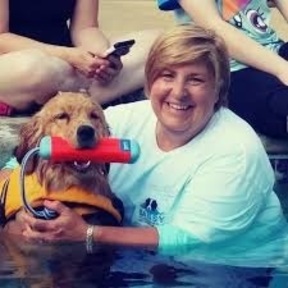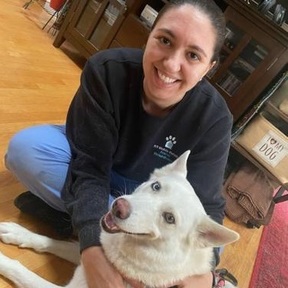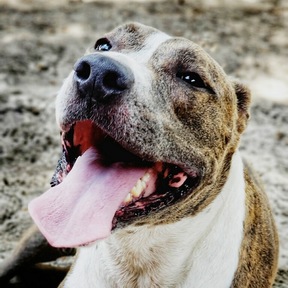nearest to you
- Francisco Maia
- TheK9PT - Canine Rehabilitation - Dog Physical Therapy - Chicago, IL
- Chicago, IL - TheK9PT is Chicago’s highest rated dog physical therapy and rehabilitation clinic! We have been in business since 2017, and in 2020 we opened a state-of-the-art facility that...
-
-
- Certified
- Insured
- Request Quote
- Barb Fuglsang
- K9 Swim & Trim, Inc. - Dog Physical Therapy - Long Grove, IL
- Long Grove, IL - Hydrotherapy in an indoor, heated, in ground pool with resistance current. DVM & CCRT (Certified Canine Rehabilitation Therapist). Also weight loss counseling. Pre & Post operative...
-
-
- Request Quote
- Cherie Dobish
- Warm Paws - Pet Physical Therapy and Animal Rehab - Mooresville, NC
- Mooresville, NC - Warm Paws provides dogs with a safe, supervised and assisted warm water swimming experience for non-impact exercise to improve canine strength, health and well-being. A focus on...
-
-
- Certified
- Request Quote
- Melynda Enslow
- Steele Creek Veterinarian - Charlotte, NC
- Charlotte, NC - Located in beautiful Southwest NC, Steele Creek Animal Hospital was founded by Charlotte, NC native Dr. Patricia Young in 1985. Our facility has been committed to providing...
-
-
- Bonded
- Insured
- BBB Accredited
- Request Quote
-
Sandra Burnett
- Sandra Burnett, BEMER Distributor, Equine Physical Therapy - Raleigh, NC
-
 INSTANT
CHECKOUT
INSTANT
CHECKOUT
 RAPID
RESPONDER
RAPID
RESPONDER
- Raleigh, NC - As a dedicated holistic RN and passionate equestrian, I specialize in providing Pulsed Electromagnetic Field (PEMF) therapy to enhance the well-being of both people and their beloved...
-
-
- Book Now
- Kate Christian
- Windcrest Animal Hospital- Pet Physical Therapy - Wilmington, DE
- Wilmington, DE - At Windcrest Animal Hospital, your pet’s health and well-being are at the core of everything we do. We believe you should be able to find comprehensive, compassionate...
-
-
- Certified
- Insured
- Request Quote
- Holli Christner
- ProsthoPets - Animal Rehab and Pet Physical Therapy - Davenport, IA
- Davenport, IA - We are here to offer prosthetic and orthotic interventions for pets/animals. We are located in the Quad Cities and serve the Iowa/Illinois area. Will travel if needed...
-
-
- Certified
- Online Sessions
- Request Quote
- Shari Sprague
- PUP Rehabilitation and Conditioning - Dog Physical Therapy - Tucker, GA
- Tucker, GA - PUP Rehabilitation and Conditioning is owned and operated by a licensed physical therapist certified in canine rehabilitation and conditioning. We are located just outside Atlanta, GA. We...
-
-
- Certified
- Insured
- Request Quote
- Sherri Griffin
- Sassy Swimmers - Dog Physical Therapy and Rehab - Birmingham, AL
- Birmingham, AL - Swimming is great for any dog that needs to achieve a state of well-being. Swimming can help with improving circulation, muscle strength, flexibility, endurance and a much...
-
-
- Certified
- Insured
- Request Quote
-
Sally Morgan
- Holistic Pet and Equine Physical Therapy - West Hatfield, MA
-
 INSTANT
CHECKOUT
INSTANT
CHECKOUT
 RAPID
RESPONDER
RAPID
RESPONDER
 RED CROSS
CERTIFIED
RED CROSS
CERTIFIED
- West Hatfield, MA - As a dedicated pet wellness expert with over 22 years of experience, I am passionate about providing comprehensive manual therapy for pain relief, recovery, and support...
-
-
- Certified
- Online Sessions
- Book Now
-
Cherie Parisi
- K9 Mobile Rehab - Pet Physical Therapy - Providence, RI
-
 INSTANT
CHECKOUT
INSTANT
CHECKOUT
- Providence, RI - As a passionate and dedicated Certified Canine Rehabilitation Practitioner (CCRP) and Licensed Veterinary Technician, I am committed to providing top-notch mobile rehabilitation services to pets throughout Rhode...
-
-
- Licensed
- Certified
- Insured
- Book Now
- Lisa Murray
- Walkin' Pets - Pet Physical Therapy and Animal Reiki Care - Amherst, NH
- Amherst, NH - At Walkin' Pets, I am dedicated to enhancing the lives of aging, disabled, or injured pets with a variety of specialized products designed for their unique needs....
-
-
- Request Quote
- Nancy Bishop
- CareRehabilitation - Pet Physical Therapy Wellness - Dennis, MA
- Dennis, MA - At my practice, I have dedicated over three years to helping dogs and cats regain their vitality through tailored wellness and recovery programs. With a background in...
-
-
- Request Quote
- Dr. Cris Macke, PT, DPT, CLT, CCRT
- Macke Institute of Canine Therapy - Pet Physical Therapy - Lincoln, NE
- Lincoln, NE - At the Macke Institute of Canine Therapy, we help injured and aging dogs move easier with less pain, so they return to happy, healthy, pain-free lives. Is...
-
-
- Licensed
- Certified
- Insured
- Request Quote
- April Cox
- Canine Health & Fitness Center For Dogs - Orlando, FL
-
 RED CROSS
CERTIFIED
RED CROSS
CERTIFIED
- Orlando, FL - We are Central Florida's only health and fitness center for dogs. We have the only indoor climate controlled warm water pool in Florida, and are the only...
-
-
- Licensed
- Certified
- Bonded
- Insured
- Request Quote
- Andrew Groome
- Well Paws K9 Rehabilitation - Dog Physical Therapy Rehab - Baton Rouge, LA
-
 RAPID
RESPONDER
RAPID
RESPONDER
- Baton Rouge, LA - We provide rehabilitation services to the canine community of Baton Rouge and surrounding areas. We treat a variety of conditions including muscular injuries, post surgical, arthritis,...
-
-
- Certified
- Request Quote
featured cities
- Pet Physical Therapy Albuquerque
- Pet Physical Therapy Atlanta
- Pet Physical Therapy Austin
- Pet Physical Therapy Baltimore
- Pet Physical Therapy Boston
- Pet Physical Therapy Charlotte
- Pet Physical Therapy Chicago
- Pet Physical Therapy Cleveland
- Pet Physical Therapy Colorado Springs
- Pet Physical Therapy Columbus
- Pet Physical Therapy Dallas
- Pet Physical Therapy Denver
- Pet Physical Therapy Detroit
- Pet Physical Therapy El Paso
- Pet Physical Therapy Fort Worth
- Pet Physical Therapy Fresno
- Pet Physical Therapy Houston
- Pet Physical Therapy Indianapolis
- Pet Physical Therapy Jacksonville
- Pet Physical Therapy Kansas City
- Pet Physical Therapy Las Vegas
- Pet Physical Therapy Los Angeles
- Pet Physical Therapy Louisville
- Pet Physical Therapy Memphis
- Pet Physical Therapy Mesa
- Pet Physical Therapy Miami
- Pet Physical Therapy Milwaukee
- Pet Physical Therapy Minneapolis
- Pet Physical Therapy Nashville
- Pet Physical Therapy New Orleans
- Pet Physical Therapy New York City
- Pet Physical Therapy Oklahoma City
- Pet Physical Therapy Omaha
- Pet Physical Therapy Philadelphia
- Pet Physical Therapy Phoenix
- Pet Physical Therapy Portland
- Pet Physical Therapy Raleigh
- Pet Physical Therapy Sacramento
- Pet Physical Therapy San Antonio
- Pet Physical Therapy San Diego
- Pet Physical Therapy San Francisco
- Pet Physical Therapy San Jose
- Pet Physical Therapy Seattle
- Pet Physical Therapy Tampa
- Pet Physical Therapy Tucson
- Pet Physical Therapy Tulsa
- Pet Physical Therapy Virginia Beach
- Pet Physical Therapy Washington DC
related articles
more info
What types of conditions can pet physical therapy help with?
Answer: Pet physical therapy is beneficial for a wide range of conditions, including post-surgical recovery, arthritis, mobility issues, and injuries like sprains or fractures. It can also be effective in managing chronic pain, improving strength and flexibility, and enhancing overall mobility. If your pet has a specific condition, it's important to discuss with the therapist whether physical therapy is appropriate and what improvements you can expect.
How do I choose a qualified pet physical therapist?
Answer: Ensure that the physical therapist you hire is certified and experienced in working with animals. Look for credentials such as a Certified Canine Rehabilitation Practitioner (CCRP) or a Certified Veterinary Technician Specialist in Physical Rehabilitation (CVT-VR). Experience in treating the specific species and conditions your pet has is also crucial. You can ask for referrals from your veterinarian, read reviews from other pet parents, and inquire about the therapist’s success stories.
What should I expect during a physical therapy session and follow-up care?
Answer: A typical physical therapy session for pets involves an initial assessment to determine your pet's physical condition and needs. The therapist will then design a customized treatment plan that may include exercises, massage, hydrotherapy, or the use of specialized equipment like treadmills or balance balls. Regular sessions and follow-up appointments are important to track progress and adjust the treatment plan as needed. Pet parents should be prepared to commit to multiple sessions and possibly learn exercises to continue therapy at home for the best results.
Finding and hiring a reputable animal rehabilitation specialist for your pet dog or cat involves a few key steps:
Seek Recommendations and Referrals:
Veterinarian Referral: Start by asking your veterinarian for recommendations. They can refer you to certified animal rehabilitation specialists they trust, who have experience in treating similar conditions to your pet's.
Ask Other Pet Parents: If you know other pet parents whose dogs or cats have undergone rehabilitation, ask them about their experiences and whether they would recommend their therapist.
Online Research: Use trusted online platforms like the American Association of Rehabilitation Veterinarians (AARV) or the International Association of Veterinary Rehabilitation and Physical Therapy (IAVRPT) to find certified professionals in your area.
Verify Credentials and Experience:
Check Certifications: Ensure that the specialist is certified in veterinary rehabilitation, such as a Certified Canine Rehabilitation Practitioner (CCRP) or a Certified Veterinary Technician Specialist in Physical Rehabilitation (CVT-VR). These credentials indicate that the therapist has undergone extensive training in animal rehabilitation.
Experience Matters: Inquire about their experience, particularly with the type of injury or condition your pet has. The more experience they have with similar cases, the better equipped they’ll be to provide effective treatment.
Visit the Facility and Conduct an Initial Consultation:
Facility Inspection: Visit the rehabilitation facility to ensure it is clean, well-equipped, and staffed by knowledgeable professionals. The facility should have the necessary equipment for your pet's specific rehabilitation needs, such as hydrotherapy pools, treadmills, or balance balls.
Consultation: Schedule an initial consultation to discuss your pet's condition and the proposed treatment plan. During this visit, observe how the therapist interacts with your pet and whether they take the time to understand your pet's needs. A good therapist will explain the treatment process clearly, set realistic expectations, and involve you in the decision-making process.
Finding the right animal rehabilitation specialist requires research, verification, and direct interaction. By taking these steps, you can ensure that your pet receives the highest standard of care, leading to a successful rehabilitation and improved quality of life.
Let pet physical therapy and animal rehab help your beloved creature recover from injury. Read reviews, rates, and book a certified pet physical therapist on Petworks now.
You may also consider booking these pet care services:
Pet Physical Therapy by State





















